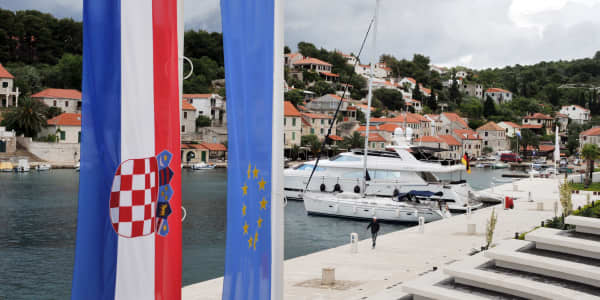Tapering in the U.S and weakness in the euro zone may have held some central and eastern European economies back, analysts say, but the real reason for the region not fulfilling its full potential is: politicians.
A group of business people, policymakers and economists from central and eastern Europe gathered at an event organised by CNBC in Vienna, Austria, Monday to look at the region's potential.
"We need a mental health clinic for populist politicians," Andreas Treichl, chief executive of Erste Group Bank, joked. "It would be a huge clinic with at least 6,000 beds."
Nearly 60 percent of attendees at the event believed that the region's own governments posed the biggest risk to its economic development.
Economic growth in the Emerging Europe countries, including Turkey and Russia as well as the CEE region, slowed to around 1 percent annual growth in the last quarter of 2012 as the euro zone debt crisis hit exports. But the pace picked up to around 2 percent in the third quarter of 2013. However, this still lags far behind the pace enjoyed by the fastest growth emerging markets like China and India.
(Read more: Can Emerging Europe's central banks fight the Fed?)
Some of the populist measures blamed for failure to tackle long-term economic issues include the replacing of Hungary's central bank governor with a government loyalist – and its subsequent focus on short-term cutting interest rates rather than tackling the country's hefty foreign exchange debt.
(Read more: Hungarian central bank completely independent: Governor)
Failure to keep up the pace of reform in the post-Communist era, the weakness of third-level education and a subsequent 'brain drain', and corruption, were all blamed on governmental weakness.
(Read more: Political woes pervade in emerging markets)
As CEE countries join the European Union, its people have taken advantage of one of the key tenets of the 28-country group: freedom of movement and labor. Politicians in some of the older European Union states, particularly the U.K., have become increasingly vocal about migrants from newer EU members like Romania and Bulgaria. The flip side of this, however, is that the CEE region is losing some of its brightest young people, according to economists.
(Read more: Is the U.K. 'destroying future' with anti-immigration stance?)
"Our region will have an even worse demographic problem than it does at the moment," Treichl warned.
Like most of the rest of Europe, the region is facing a aging or "greying" population after increasing life expectancy and lower fertility rates. This problem is exacerbated by the lack of private pension provision, a hangover from the socialist era.
By 2060, Bulgaria's population will shrink by 28 percent, Latvia's by 26 percent, Lithuania's by 24 percent, Romania's by 21 percent and Poland's by 18 percent, according to Eurostat forecasts.
This makes the retention of talent ever more important to the region, according to the opinion-formers gathered by Erste.
To keep young people, and attract more from outside, the region needs to reduce barriers to trade, generate cheap energy through shale gas exploration, provide cheap housing and long term financing, according to a plan devised by Eduard Zehetner, chief executive of Immofinanz, the Austrian property investor, with other regional experts.
"We have to keep people in the region," he told the event.
- By CNBC's Catherine Boyle. Twitter: @cboylecnbc.






